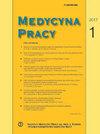Nurses’ intention to leave their jobs in relation to work environment factors in Polish hospitals: Cross-sectional study
IF 0.8
4区 医学
Q4 PUBLIC, ENVIRONMENTAL & OCCUPATIONAL HEALTH
引用次数: 0
Abstract
Background: The lack of nursing staff is a current problem not only in Poland, but also in the world. The decision of nurses to leave the workplace, apart from the financial aspect, often results from unfavourable working conditions related to the work environment. Material and Methods: The study was multicentre, cross-sectional. The study was conducted among a group of 1509 nurses employed in surgical and internal medicine wards in 21 hospitals in Poland. The key variables of the study were: the intention of the nurses to leave their jobs, the nurses’ working environment, the level of satisfaction, the level of occupational burnout and the number of patients cared for on the last shift, the number of nurses on the last shift. The Practice Environment Scale of the Nursing Work Index (PES-NWI) and the Maslach Burnout Inventory (MBI) questionnaire were used in the research. Results: Almost half of the surveyed nurses (48.84%) declared their willingness to leave their current workplace. The statistical analysis showed that nurses declaring their willingness to quit their job in the hospital where they were employed were significantly younger (42.88 vs. 45.04, p = 0.000), had shorter total length of service overall (19.96 vs. 23.20), and also in the hospital where they were employed (15.86 vs. 18.50, p = 0.000). The increase in the number of patients by one was significantly associated with a 1% increase in the risk of leaving work (OR = 1.01, 95% CI 1.00–1.02). An increase in emotional exhaustion significantly increased the risk of leaving work by 2% (OR = 1.02, 95% CI 0.99–1.03). Conclusions: Younger age of nurses, greater workload resulting from more patients and occupational burnout – emotional exhaustion is correlated with the risk of leaving work in the hospital. A lower risk of leaving the job is associated with a higher level of job satisfaction in the hospital波兰医院护士离职意向与工作环境因素的关系:横断面研究
背景:护理人员的缺乏不仅在波兰,而且在全世界都是一个当前的问题。护士离开工作场所的决定,除了经济方面,往往是由于与工作环境有关的不利工作条件。材料与方法:本研究为多中心横断面研究。这项研究是在波兰21家医院的外科和内科病房的1509名护士中进行的。研究的关键变量为:护士离职意向、护士工作环境、满意度、职业倦怠水平和末班护理患者人数、末班护士人数。采用护理工作指数执业环境量表(PES-NWI)和Maslach职业倦怠量表(MBI)进行研究。结果:近一半的受访护士(48.84%)表示愿意离开目前的工作单位。统计分析显示,表示愿意离职的护士在所在医院中明显年轻化(42.88比45.04,p = 0.000),总体总年资较短(19.96比23.20),在所在医院中也明显较短(15.86比18.50,p = 0.000)。患者人数每增加1人,离职风险增加1%显著相关(OR = 1.01, 95% CI 1.00-1.02)。情绪疲惫的增加显著增加了2%的离职风险(OR = 1.02, 95% CI 0.99-1.03)。结论:护士年龄越小、病人越多、工作量越大、职业倦怠-情绪耗竭与离职风险相关。较低的离职风险与较高的医院工作满意度相关
本文章由计算机程序翻译,如有差异,请以英文原文为准。
求助全文
约1分钟内获得全文
求助全文
来源期刊

Medycyna pracy
PUBLIC, ENVIRONMENTAL & OCCUPATIONAL HEALTH-
CiteScore
1.90
自引率
10.00%
发文量
35
审稿时长
6-12 weeks
期刊介绍:
The journal publishes original papers, review papers and case studies in Polish and English. The subject matter of the articles includes occupational pathology, physical, chemical and biological agents at workplace, toxicology, mutagenesis, health policy, health management, health care, epidemiology, etc.
The magazine also includes reports from national and international scientific conferences on occupational medicine. It also contains letters to the editor. Each first-in-year issue of the magazine comprises former-year indices of authors and keywords.
 求助内容:
求助内容: 应助结果提醒方式:
应助结果提醒方式:


